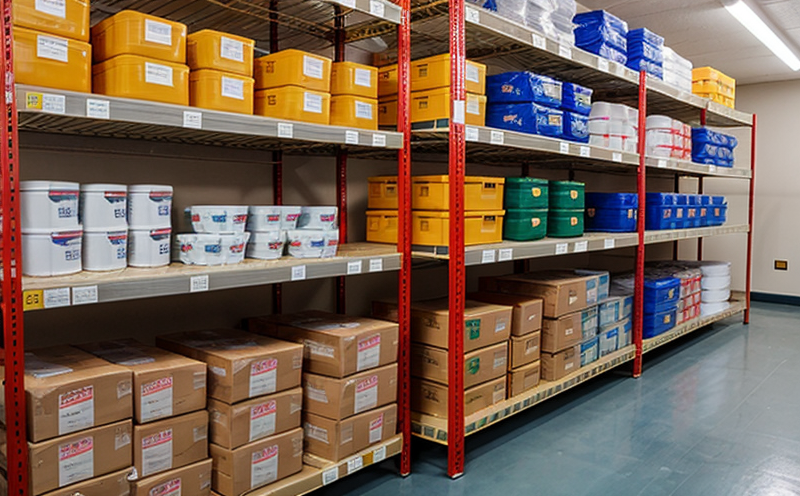Intermediate Stability at 30C 65RH Testing
The Intermediate Stability at 30°C (86°F) and 65% Relative Humidity (RH) test is a critical component in the quality assurance process for pharmaceutical products. This testing method helps determine the shelf-life of drug formulations by simulating conditions that are typically experienced during distribution, storage, and transportation.
The purpose of this stability study is to evaluate how product integrity is maintained over time under conditions that are more severe than ambient but less harsh than extreme environments like those found in an accelerated degradation test. By conducting such studies, pharmaceutical companies can ensure their products remain effective and safe for use well past the initial packaging date.
This specific test focuses on real-world scenarios where temperature fluctuations may occur due to shipping delays or storage conditions that do not meet optimal levels. For instance, a drug product might be exposed to higher temperatures during transit from production facilities to retail outlets. Similarly, it could encounter humidity changes when stored in warehouses or at point-of-sale locations.
Understanding these challenges is essential because even small deviations from ideal conditions can affect the stability of active pharmaceutical ingredients (APIs) and excipients used in formulations. Changes in temperature and humidity can lead to degradation reactions that alter potency, efficacy, and safety profiles.
The testing involves exposing samples to specified environmental conditions for a predetermined period. During this time, regular checks are made to monitor physical properties such as weight loss, color changes, or crystallization behavior; chemical characteristics like drug purity; and biological attributes including microbial content if applicable. These observations help assess whether the product remains stable under these less-than-ideal circumstances.
A key aspect of intermediate stability testing lies in its ability to provide meaningful insights into potential issues before they become critical problems during commercial sales or use. This proactive approach allows manufacturers to address any identified concerns early on, potentially saving significant costs associated with recalls or lawsuits resulting from compromised product quality.
Moreover, this type of testing plays a crucial role in compliance with regulatory requirements set forth by organizations like the United States Food and Drug Administration (FDA), European Medicines Agency (EMA), World Health Organization (WHO), and other national authorities responsible for drug regulation. Adherence to these standards ensures that all products meet stringent quality benchmarks.
Conducting intermediate stability tests is not only about ensuring compliance but also contributes significantly to the overall success of a pharmaceutical product lifecycle management strategy. It allows companies to make informed decisions regarding formulation modifications, packaging improvements, and storage guidelines aimed at enhancing shelf-life performance while minimizing risks associated with premature degradation or contamination.
In summary, Intermediate Stability at 30°C (86°F) and 65% RH testing offers valuable information necessary for predicting the stability of pharmaceutical products under non-ideal conditions. Through rigorous evaluation processes, manufacturers can gain confidence in their product's ability to withstand real-world challenges throughout its lifecycle.
Benefits
- Predicts Product Stability: Provides insight into how a drug will perform under less-than-ideal storage conditions.
- Saves Time and Money: Identifies potential issues early, avoiding costly recalls or product discontinuations later in development.
- Ensures Regulatory Compliance: Meets requirements set by regulatory bodies like the FDA and EMA to ensure safe and effective drug products.
- Enhances Product Quality: Improves shelf-life performance through better understanding of environmental impacts on formulations.
The results from intermediate stability tests are instrumental in optimizing manufacturing processes, selecting appropriate packaging materials, and developing robust distribution strategies. By leveraging this data, pharmaceutical companies can enhance patient safety by ensuring that their products remain stable and efficacious throughout the supply chain.
Eurolab Advantages
Comprehensive Expertise: Eurolab is staffed with highly qualified professionals who possess extensive experience in pharmaceutical testing. Our team stays current with industry trends, ensuring that we apply best practices and adhere to the latest regulatory guidelines.
State-of-the-Art Facilities: We are equipped with advanced equipment capable of simulating a wide range of environmental conditions, including those specified for intermediate stability tests (30°C/65% RH). This allows us to provide accurate and reliable results that reflect real-world scenarios.
Accurate & Timely Reporting: Our rigorous quality control measures ensure consistent accuracy in our test results. Additionally, we pride ourselves on delivering timely reports so you can make informed decisions promptly.
Comprehensive Support: From initial consultation through final analysis and report generation, Eurolab offers full support throughout the testing process. Our experienced staff is available to answer any questions or address concerns you may have regarding our services.
International Acceptance and Recognition
- FDA Compliance: Tests conducted at 30°C/65% RH are widely accepted by the FDA as part of their regulatory framework for ensuring drug quality.
- EMA Approval: Similar conditions are recognized by the EMA when assessing the safety and efficacy of pharmaceutical products.
- WHO Guidelines: The World Health Organization recommends these tests to ensure global standards are met across different regions.
- ISO/IEC Standards: Our methodologies align closely with international standards like ISO 11379, which provides criteria for accelerated stability testing.
The acceptance of our test results extends beyond just regulatory bodies; many leading pharmaceutical companies worldwide trust Eurolab's expertise and consistently reliable data. By participating in global markets, these organizations rely on the consistent quality that comes from using well-established methods like 30°C/65% RH stability testing.





